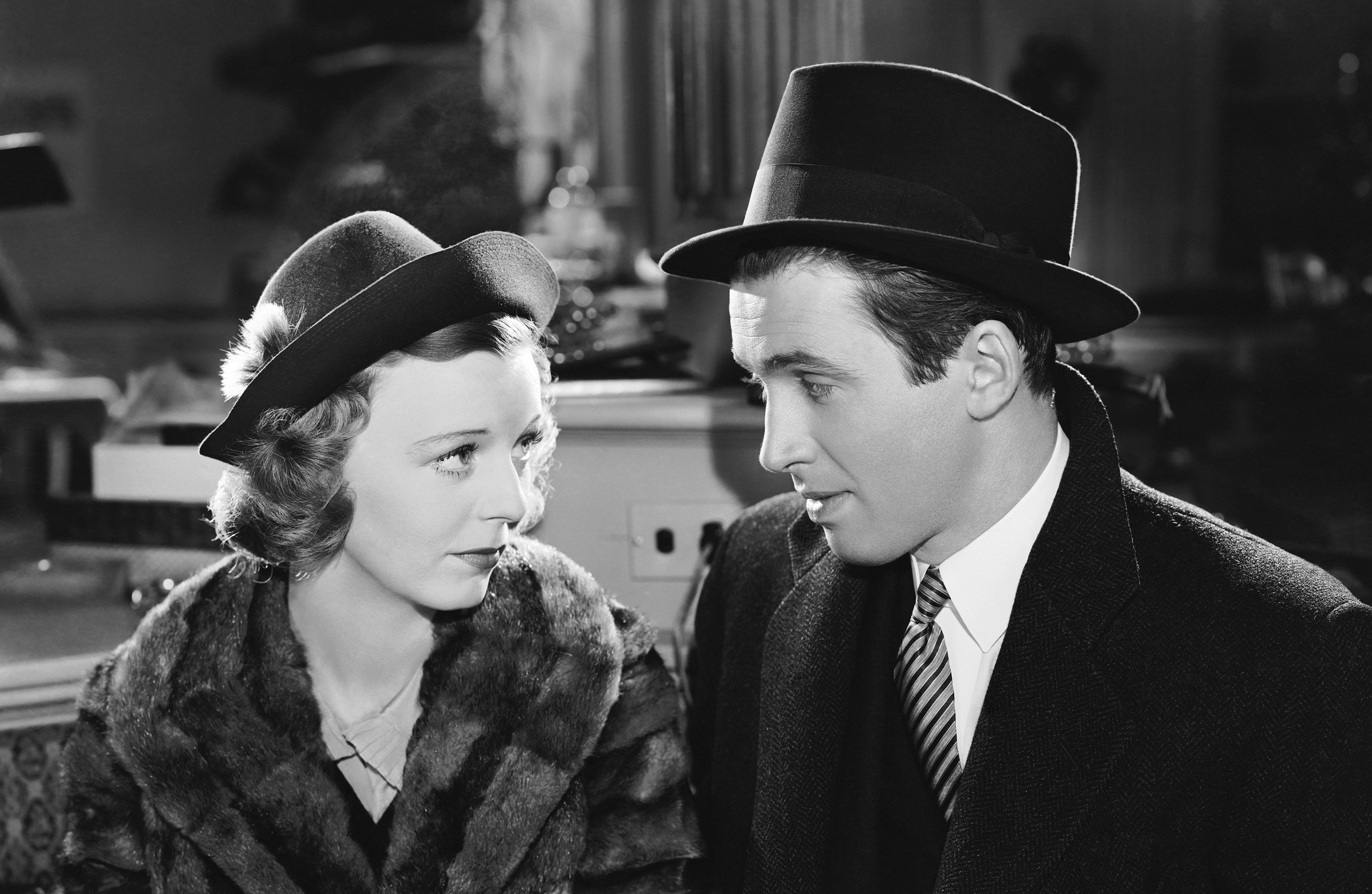I began a series of essays on Christmas movies last week with The Bishop’s Wife (1947), a story about church, the community of the faithful, and spiritual responsibility. This week, I’m writing about a less lofty subject, the community of the workplace and the life of commerce, but a much better movie, The Shop Around the Corner (1940), one of the classics of old Hollywood, directed by Ernst Lubitsch and starring Jimmy Stewart and Margaret Sullavan as shopkeepers who fall in love over Christmas.
The story, if you can believe it, is set in Central Europe, in Budapest, in a leather goods shop, where we meet half a dozen men and women who work together and come to share their joys and sorrows, and whose livelihoods depend especially on seasonal sales. The movie starts with the summer sales, when a young woman in search of a job is hired, Sullavan, and ends with the Christmas sales, when Stewart is finally promoted to manage the prospering shop, a reward for his honesty and decency. In between, they quarrel in person and woo by letter, anonymously; they also break then give to each other their heart. Christmas brings them joy and consolation, as it does the rest of the cast, whom we gradually come to think of as a family.
This is a European story and accordingly dwells more on life’s sorrows and humiliations. The man who owns the shop, Matuschek (played by Frank Morgan, a character actor, twice Oscar nominated), is by turns despotic and paternal, and his employees are accordingly servile, since their livelihoods depend on him in a bad economy, even his whims, pet peeves, and indeed his marital troubles, which play a large part in the plot. It’s an almost feudal social arrangement in which the favor of the boss, including such evidence as an invitation to dinner at his mansion, decides everything.
The advantage of the arrangement for the workers is that only the boss worries about profits and losses, changing tastes and varying trends in business. He alone bears these burdens. The disadvantage is that one man’s mistakes can make everyone miserable. Matuschek’s pride is humbled when he loses his wife to adultery, and then his best worker, Stewart, because he mistreated him. Eventually he tries to commit suicide. Christmas is saved almost miraculously by the lowliest worker, the delivery boy, who not only stops the desperate act but also restores him to humanity. So the shop becomes a community in the story, and it’s refounded in a rather Christian way.
The story suggests that modernization is necessary here—competent employees should become managers and treat everyone better by humbling the boss somewhat. But so far as the conflict between labor and capital goes, the story suggests that a workplace that’s more like a family is the civilized solution, not revolution. More than that, it’s almost a Christmas fairy tale in which an entire society is humanized by caring for each other and coming together in a season of celebrations. Christmas is a necessity to the entire society, since it teaches generosity and gratitude, the most important part of justice, and the one that cannot be compelled.
Lubitsch made a comedy out of a problem that also makes for tragedy—the tension between commercial rationality and sentimental commitment that describes our way of life, divided and always threatening to tear us apart. Modern life is primarily private life, most of us stay out of politics, for example, even if we have opinions about it, even if we express them very loudly. And our private lives are dominated by commerce—most of us have to work for a living, most of what we have is bought and sold, and this takes up perhaps the majority of our waking lives.
Of course, a man is not a job—but it’s hard to say what a man is apart from the economic life of a city or nation; it seems we find out who we are by finding out what it is we most lack, most desire, can’t do without, the lack of which might make us, especially when we’re young, contemplate suicide. This is romantic love, the attachment that is most radically opposed to the life of commerce. Stewart and Sullavan believe love is for life, complete and exclusive, unchosen and unreasonable, and irreplaceable. Comparatively, jobs come and go, contracts are made and fulfilled or broken, alternatives to any partnership are considered rationally, improvements and advantages and bargains always sought.
Lubitsch thinks it’s very funny that our way of life revolves around commerce, but commerce is almost never what we want out of life ultimately. Commerce stimulates our imaginations and builds habits of choice—we choose what we desire and come to think we can own or control whatever might give us happiness. Yet we are always looking to escape commerce and choice. We are looking for something that will make us happy precisely by no longer involving changes, alternatives, and the uncertainty they bring. Our hearts long for permanence instead. Love puts the thought of eternity in our heads.
The desires we satisfy by buying and selling are comparatively uninspiring. We are stuck in a way between beautiful dreams, romanticism, and choices that, if not ugly, certainly remind us that every good thing we get is negotiated, acquired, and potentially lost, got by difficult work and never free from worry. We can have success, but it will break our hearts, because it’s not forever. And yet The Shop Around the Corner also reveals the dark side of romanticism—the cruelty the young woman in love is capable of, as a romantic disdainful of bourgeois men; as well as how chasing after beauty or glamour can lead to abjection and despair. Love is a very dangerous thing, and it is only within the larger partnership of the shop that the practical and sentimental sides of life come together happily.
The comic idea in the movie, conducting romance blindly through pseudonymous letters, seems to follow from the fact that there’s no sentimental education available in the modern life of commerce. There’s no way to judge from business what is in a man’s or woman’s heart. How does one know whom to trust with one’s most intimate longing? This leads to great trouble—love is supposed to rescue these young people from a life of business, but in the realm of love they are lost. It’s a bit of a miracle that a happy end is even possible—it’s the hopefulness of Christmas that the girl doesn’t end up like the heroine she admires, Madame Bovary.
The 1998 remake, You’ve Got Mail, written and directed by Nora Ephron, did much to eliminate the young romantic woman’s cruelty and the young man’s canine loyalty. This takes away the need for any miracles, but also makes love boring. It’s a sentimental remake, but it has no right to sentimentality: It doesn’t know why people’s hearts ever break. Perhaps that’s why it’s not a Christmas story anymore. It was a big success—Tom Hanks and Meg Ryan made very successful comedies together that decade.
Ephron wanted to restore romantic comedy to its high place to deal with modern life in America, but she wanted even more to domesticate romantic love to eliminate its tragic potential. There’s no potential for faith either in such a situation, because the essence of love is gone. One wonders how a remake today would go—romance seems to be dead, there’s little love left in the culture, but there is at least an undercurrent of hysteria concerning men and women, and certainly the anonymous love found in office romance and social media would make for timely storytelling.
Stranger still, You’ve Got Mail is about big bookstores driving small stores out of business, just as Amazon was beginning to drive everyone out of business. For a movie where love comes by email, Ephron had no idea that America was coming under the domination of bobos and techbros. We’d have been better off had David Brooks performed the social observation for ’90s romantic comedies. Instead, we get an impoverished story, where the workplace not only doesn’t make for friendship and a kind of family—it’s eliminated. Thus, poetry surrenders to technology: Young Americans now mostly settle for digital love and don’t expect Christmas miracles. We must prepare for the digital future, but we can do so only if we first remember how love makes life, including in digital America, worth living. And if we want people to get married, we had better learn from masters like Lubitsch, then get back to making romantic comedies we can love and share across the generations. Such art can restore the charms and dangers of love and teach people how work and flesh-and-blood community can make room for love.

